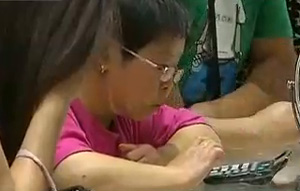Shanghai tackles e-waste with innovative approach
Updated: 2013-06-04 17:34
By SHI YINGYING in Shanghai (chinadaily.com.cn)
|
|||||||||||
Shanghai native Huo Daren said every time he threw out an old fluorescent tube, he felt like he was committing a crime, but he had no choice.
"The neighborhood had a recycling spot for used batteries, but they just drop them into the household garbage once the box is full," complained Huo, who's also a deputy to the National People's Congress.
Zhang Quan, director of the Shanghai Environmental Protection Bureau, said: "The recycling of some relatively smaller electronic devices, such as remote controls and cell phones, is the focus of our next step."
Fluorescent tubes are classified as hazardous waste as they contain mercury, Zhang said. They are also extremely fragile.
"We're discussing with the city's sanitation department to see whether it's possible to run a pilot project to trade new goods for old in some of the city's big supermarkets," he said.
Shanghai will produce about 3.5 million tons of electronic waste during the 12th Five-Year Plan (2011-2015), according to Shanghai Evening Post.
The director said each year Shanghai generates about 3 million electronic appliances in waste, mainly televisions, washing machines, refrigerators, air conditions and computers.
Zhang Suxin, president of Shanghai Jinqiao Group, which runs a recycle company and a renewable resource management company, said the firms are doing long-term "guerrilla warfare" with private electronic devices.
Up to 60 percent of residents choose to sell the used devices to waste collectors or secondhand markets, which are easily found in their neighborhoods.
"However, they (those private collectors) cause secondary pollution, without a doubt," said Zhang Suxin.
Shanghai currently has eight recycle companies. The green power e-platform www.alahb.com, under Shanghai Jinqiao Renewable Resources Market Management Co Ltd, encourages residents to recycle devices through official channels with a reward system.
A 26-inch color television, for example, could be traded for 6,000 points on a scoring system developed by the website.
A report from the United Nations Environment Program pointed out that China is the second-largest producer of e-waste, after the US, with an estimated 2.3 million tons of waste generated annually.
Related Stories
Hong Kong unveils 10-year waste management plan 2013-05-20 23:25
Shanghai seizes 6,000 tonnes of foreign waste 2013-04-11 23:02
Today's Top News
KPMG: Broaden horizons on M&As overseas
Eurozone economy 'on course for recovery'
Chinese remain biggest overseas spenders
China remains a magnet for foreign investment
Arms Trade Treaty opens for signature
Chinese, Costa Rican presidents discuss co-op
Second female astronaut picked
Family plans lawsuit in teen worker's death
Hot Topics
Lunar probe , China growth forecasts, Emission rules get tougher, China seen through 'colored lens', International board,
Editor's Picks

|

|

|

|

|

|





